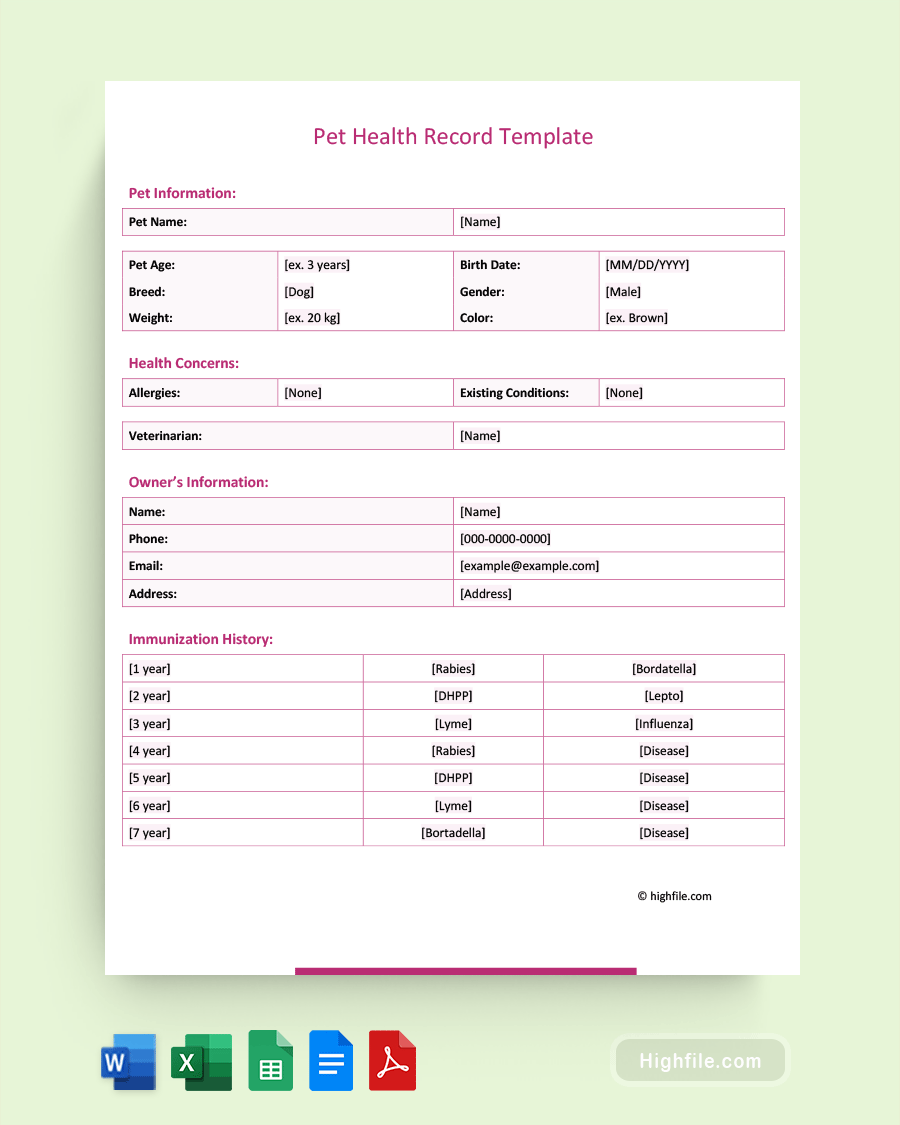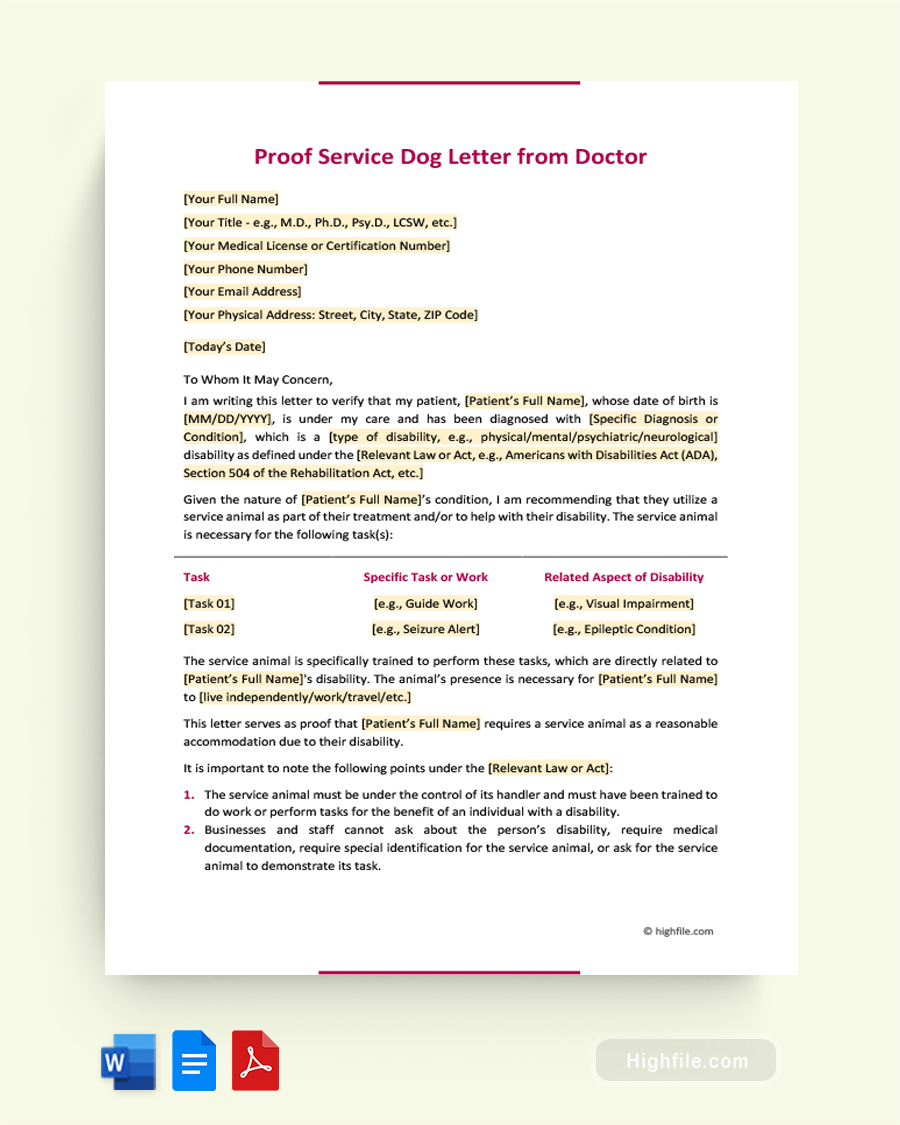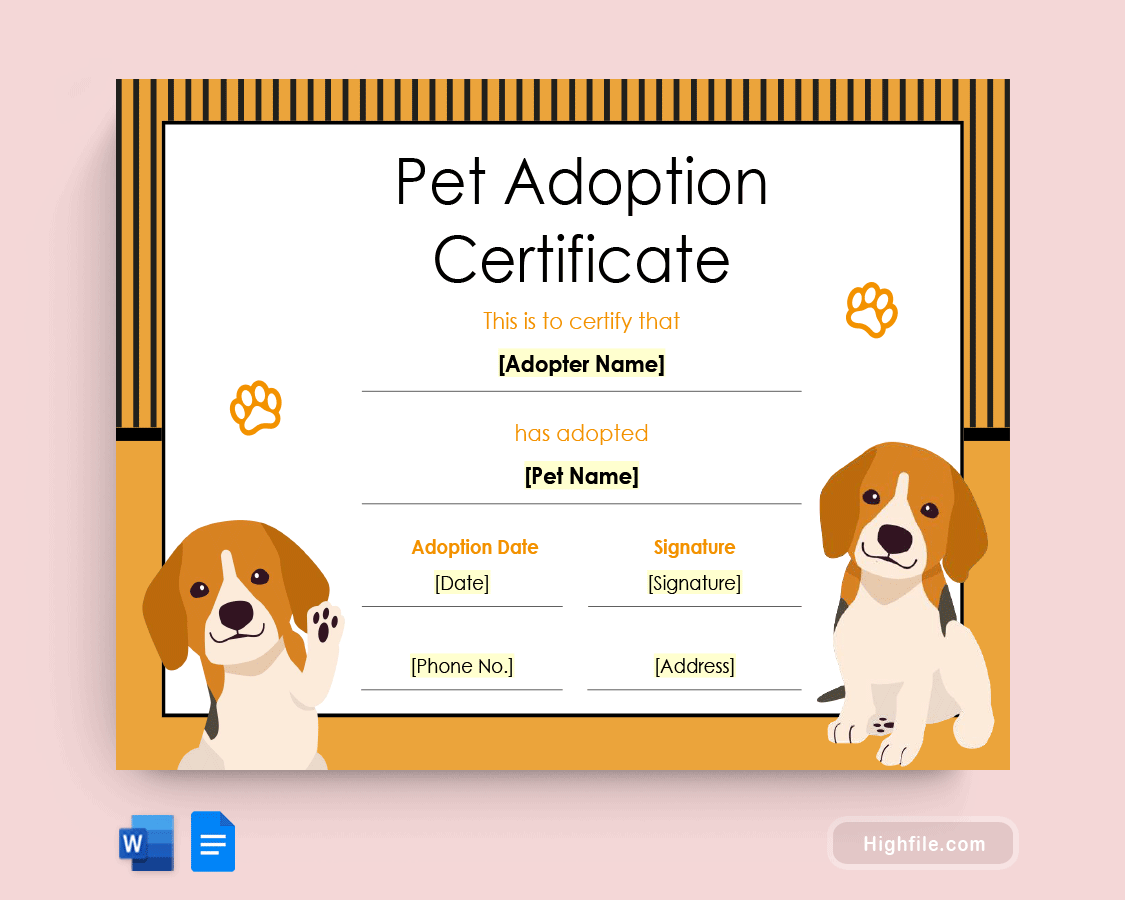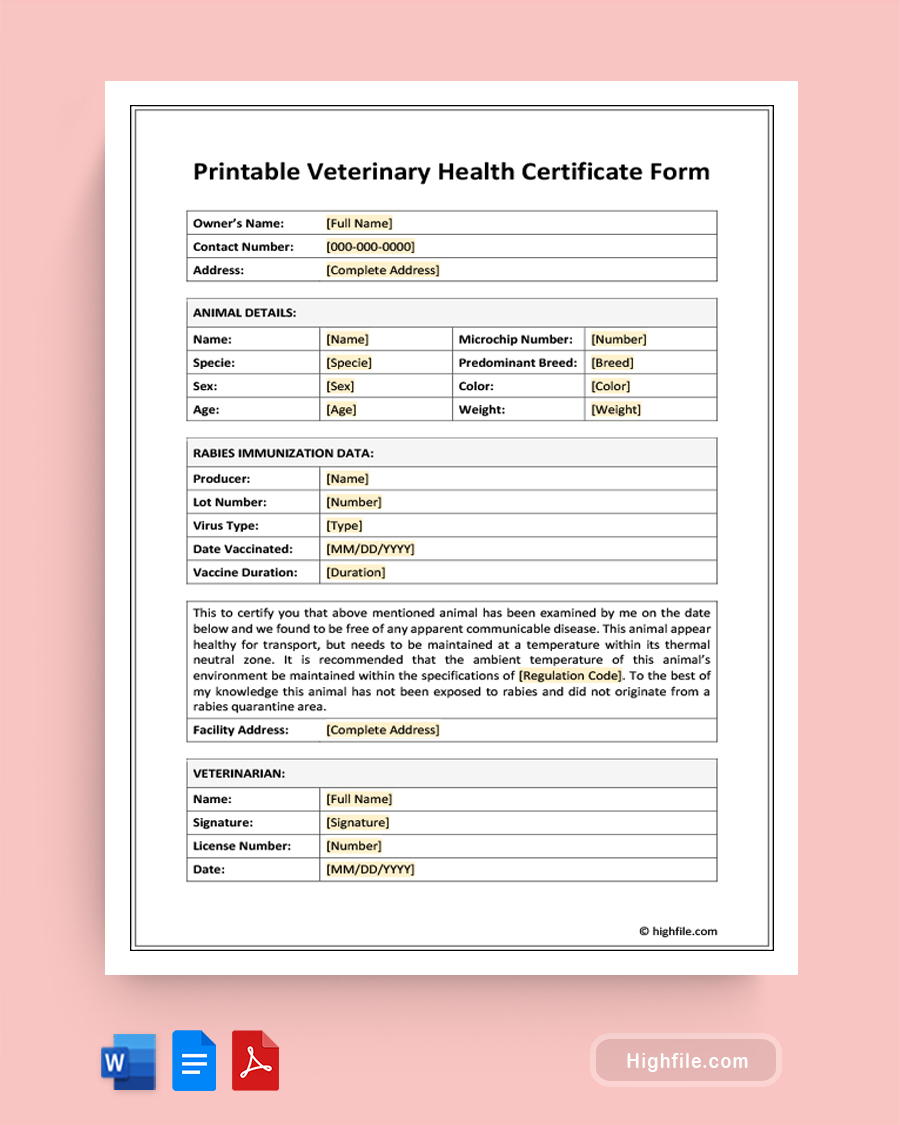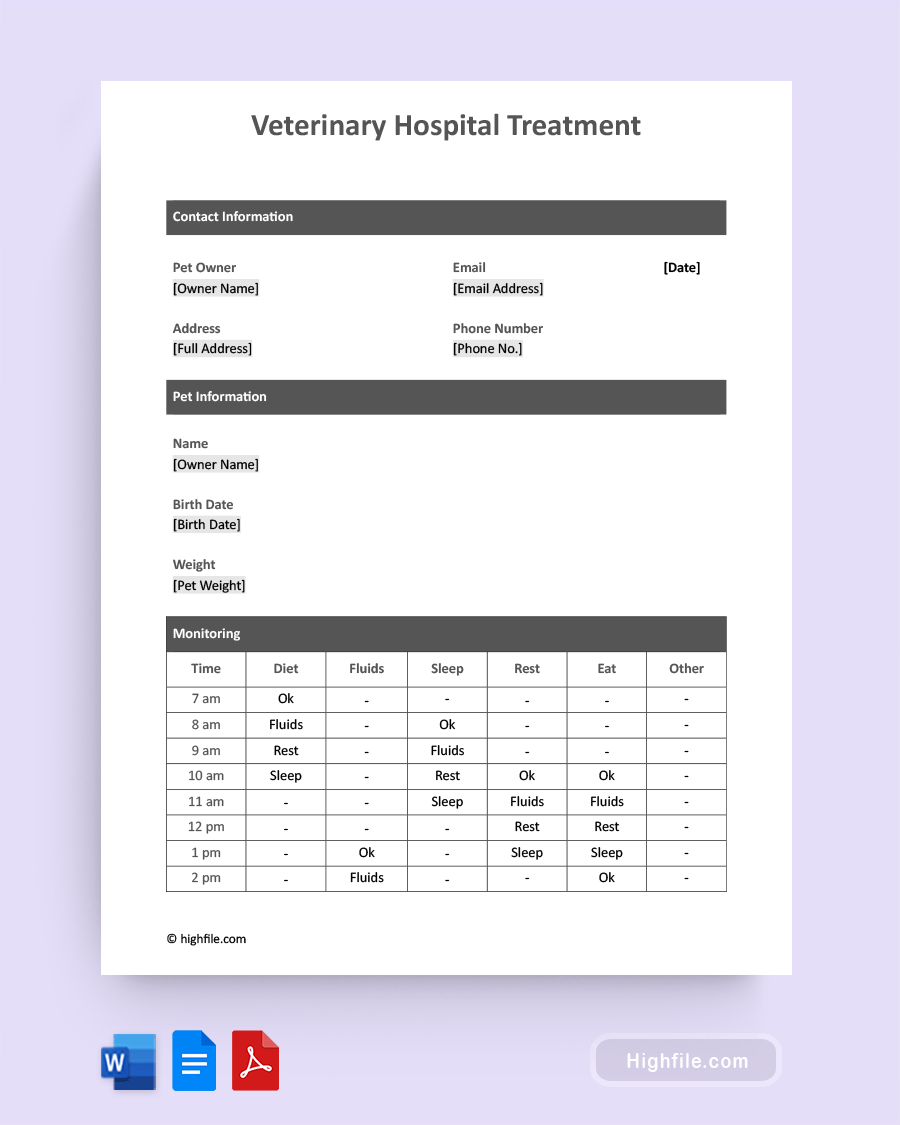Everyone wants to keep their pets happy and healthy. Having a pet health record template is essential for pet owners. This document records all the important health milestones and information related to a pet’s care. It can help pet owners keep track of their pet’s medical history, vaccinations, medications, and other important information. It is also a valuable resource for veterinarians, who can use the record to provide more targeted and effective care for the animal. Having a pet health record template can help pet owners make sure that their furry friends get the best care possible and remain healthy for years to come. Using a professionally designed template can help you quickly create a high-quality pet health record for any animal.
What Is a Pet Health Record?
A pet health record is a written history of a pet’s medical care. It is managed by the pet’s owner and includes information such as vaccinations, medical treatments, visits to the veterinarian, and any other relevant health information. Pet health records are invaluable for ensuring that a pet receives the best possible care and tracking any changes in their health over time. In addition, having a complete pet health record can help veterinarians make informed decisions about diagnosis and treatment.
What Is a Pet Health Record Template?
A Pet Health Record Template is a document used to create a form to keep track of all the basic medical information and treatments related to a pet. This includes information on vaccinations, visits to the veterinarian, medications, and any other treatments that have been administered. It also includes details of any allergies or other medical conditions diagnosed in the pet. The template helps owners keep an organized record of their pet’s health with all the essential information in the right places. It can be used as a reference when they take their pet to the veterinarian or when they need to make decisions regarding their pet’s health care.
Why Is it Important to Keep Pet Health Records?
Keeping a pet health record is an integral part of good pet ownership. By keeping a record of your pet’s health, you can be sure you are getting the best possible care. A pet health record is a compilation of information about your pet’s health, including medical history, vaccinations, and treatment for any illnesses or injuries. However, it is essential to note that it is not a replacement for regular vet visits.
A pet health record can also help you ensure that your pet gets the proper vaccinations and treatments when they need them. Moreover, it can help you know what your pet needs before and after a trip to the vet and may help you get the proper diagnosis for your pet so that you can start treatment earlier.
Essential Elements of Pet Health Record Template
The essential elements of a pet health record template can help pet owners keep all their animals’ vital health information in one organized form. Below, we’ve created an overview to explain what belongs in this crucial document and why.
- Form Title- The title of your form should state in large bold print that this is a “Pet Health Record.”
- (Optional) Business Logo- If you are a business issuing a copy of the record, include your logo or business name here. However, private pet owners should skip this step.
- (Optional) Business Address and Contact Information- For businesses such as shelters and pet shops include your business address and contact information below the title or logo.
- Pet Picture and General Information- Keep a current picture on one side of this section. On the other, include data such as the pet’s name, age, breed, gender, and weight.
- Pet Health Info- If your animal has any preexisting health conditions or allergies, note them here, along with the name and address of your regular veterinarian.
- Owner Name and Contact Information- This is self-explanatory—type in your full name, email, phone number, and street address.
- Immunizations- A chart is the best way to record pet immunizations. Note their age at the time and which shots were given.
- Medical History- Just like immunizations, this will be a chart. It should note the date and type of treatment, vet, diagnosis, tests, results, medications, and any important comments or notes.
- (Optional) Behavior Notes- You can add a section at the bottom to note any quirks or behavioral issues your pet experiences. Although this isn’t necessary, it can be beneficial for vets and veterinary staff.
Pro Tip: Your pet’s health is private information. These vital documents contain data about your animals and their owners. Unfortunately, they can be hacked or stolen and used for nefarious purposes. Keep physical copies in a locked cabinet or safe alongside other vital documents. When storing it online, ensure it is password locked and never share your passwords with anyone. Using two-factor authentication is another great way to keep your data secure because it adds an additional challenge for digital thieves.
How to use a Pet Health Record Template
Using a pet health record template is easy. Follow the steps below to make sure your animals’ records are always up-to-date and accurate.
- Use a Professional Template- Staying organized is easier when you use a high-quality, professionally designed template to create your forms.
- Medications- Use the template provided to ensure your pet is current on their vaccinations and medications. Write down the date, type, and dosage of each medicine given to keep track of and ensure your pet’s health.
- Conditions- It is important to note your pets’ existing medical conditions in the template. Doing this will help you track what treatments or medication they may need in the future. Doing this will ensure you can provide your pet with the best care possible.
- General Info- It is vital to record your pet’s other information. Make sure to include details such as the name, age, breed, and any distinguishing features like a microchip number or collar tag.
- Vet Visits- Whether it is a checkup or a major surgery, take the time to record every vet visit and its results on your pet’s health record.
- Track Changes- Utilizing the template can help you keep track of all health changes your pet may experience. Please keep a record of any symptoms like vomiting/diarrhea that take place, and make sure to note the date and time they occurred. This gives you an improved understanding of your pet’s well-being and also helps spot any potential recurring issues.
- Share Data- Take the record with you to your veterinarian appointments to allow them a more comprehensive understanding of your pet’s medical background and provide better diagnoses & treatment advice. Sharing the record with your vet can help deliver the best care possible for your companion.
- Update Often- To stay on top of your pet’s health, regularly update the template with any vaccine or medication changes. Doing so will help you have an accurate and up-to-date record of your pet’s well-being.
Common Mistakes to Avoid When Using a Pet Health Record Template
Using your pet health record template is a superb way to track all your pet’s vital information. However, it’s easy to forget or even fail to keep track of things. Here are some of the most common mistakes to avoid when using your pet health record template.
- Assuming the Vet Knows Everything- Veterinarians are people too. Not only do vets sometimes have incomplete records, but they may not have them. Data corruption, failure of a previous vet to transfer or keep the information, and even getting hacked can all affect whether your vet has the information you need to keep track of for your pet. Always assume it is your duty to keep the records for your pet.
- Failing to Update- Getting busy or sidetracked and forgetting about doing your updates is easy. Try always to change or add to your pet’s medical record as soon as anything happens and after every vet visit. Additionally, you should set a reminder on your calendar for a twice-a-year audit of what you have recorded.
- Not Saving Everything- It is better to have more information than you need than less. Keep every physical record, every receipt, and correspondence. Doing this allows easy access to the information you need to fill out your pet health record template.
- Incomplete Information- You can’t always assume you’ll have all the information, especially if you adopt an animal. However, it would be best if you still strived to keep and update every piece of medical history you acquire for your pet.
- Disorganized Recording- If the record of your pet’s puppy shots is hidden in the wrong section of the form, it will be harder for you or the veterinarian to understand their health record. A high-quality pet health record template can help with this, but you must use it correctly and track when each event occurred.
- Inaccurate Data- Be careful when updating or creating your pet’s health record. Use a template and be consistent about how you record things.
- Failing to Record- Never put off adding to your pet’s health record. Unless there is an emergency, you should always update immediately while the memory is still recent. Aim to record new data on the template the same day anything related to your pet’s health happens.
FAQs
Keeping track of your pet’s health history is vital. We’ve answered the most frequently asked questions about pet health records to help you get the most out of your template. You’ll find information about tracking vaccinations, diet and exercise, and many other helpful facts here.
It is essential to keep your pet’s health records up to date, as it helps to ensure that your pet receives the best possible care. The frequency with which you should update your pet’s health records depends on the age and health of your pet, as well as any changes in the environment or lifestyle of your pet. Generally speaking, it is recommended that you update your pet’s health record at least once a year. It is also important to update your pet’s history whenever there are changes in their diet, medications, or other treatments. If you have any questions about keeping your pet’s health records current, don’t hesitate to contact your vet’s office.
It is necessary to keep a record of your pet’s vaccinations. Vaccinations help to prevent your pet from getting sick and can also help in the diagnosis and treatment of illnesses if any do occur. Keeping an accurate record of your pet’s vaccinations will ensure that all of your pet’s immunizations are up to date and that any new vaccinations are added when necessary. In addition, having a record of your pet’s vaccinations can be beneficial in the event that you need to prove proof of vaccinations (i.e., when traveling). It is also crucial to keep a record of any adverse reactions that may occur after receiving a vaccination.
Common reasons for a dog to need a rabies vaccine include:- moving to a new location from another country or state or traveling in a foreign country with an unknown rabies history- entering the animal into a pet show that requires an affidavit of rabies vaccination status- entering the animal into a pet competition (i.e., agility) that requires additional pre-exposure vaccinations – receiving an import permit from a foreign government- adopting a dog with no vaccination history or without an adequate rabies vaccine history- transporting the animal to a veterinary hospital for treatment, including spaying/neutering, dental care, and hospitalization.
If you lose your pet’s health record, the first thing to do is to contact your veterinarian and ask for a copy of the original documents. Your veterinarian should be able to provide you with an updated copy of your pet’s health record. In some cases, veterinary clinics may also offer digital copies of documents that can be accessed online. If you are unable to obtain a copy from your veterinarian, you may need to contact other clinics that have seen your pet in the past. This can be done by contacting the clinic directly or searching for the clinic’s website.
Using a pet health record template enables you to save a digital copy. We recommend having a physical copy, a copy on your home computer or laptop, and one stored in the cloud to prevent future issues with access to this vital document.
A Pet Health Record Template can be a great starting point for tracking your pet’s diet and exercise, but more comprehensive diet and exercise tracking tools are available. Consider other forms or online apps that allow you to customize for this specific type of recording, such as recording the type of food and treats your pet eats, monitoring their weight and activity level, and tracking any health issues they may have. This way, you can have a more comprehensive overview of your pet’s health that can be easily accessed and updated whenever necessary.
Final Thoughts
A Pet Health Record Template is a valuable tool for pet owners to make documents to keep track of their pet’s medical history. It can help identify potential health issues and ensure the animal is on a healthy path. The template will provide the owner with proper placements for important information such as the animal’s health, vaccinations, medications, and other vital data such as the date of their last wellness exam. Without this record, an owner may accidentally overlook something important such as regular checkups and vaccinations. Utilizing a Pet Health Record Template can help ensure your pet receives the best care possible. With a good pet health record, you and your vet can access and assess your pet’s health quickly and efficiently, leading to fewer mistakes and better health care for your furry friend.
